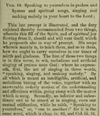brendanchatt
Puritan Board Freshman
I think this could go in church order or worship, lmk. This thread was spawned from this post https://puritanboard.com/threads/who-may-read-the-scriptures-in-public-worship.95036/#post-1160127
and discussion following between myself, Edward, and Chris (The Old Course).
-----
I don't participate in responsive readings at church. I don't think I should be reading the scriptures, especially not in unison.
I sing the Psalms in church. You can abstract the components of singing and make little of the tune. I disagree with this.
Your thoughts...
and discussion following between myself, Edward, and Chris (The Old Course).
-----
I don't participate in responsive readings at church. I don't think I should be reading the scriptures, especially not in unison.
I sing the Psalms in church. You can abstract the components of singing and make little of the tune. I disagree with this.
Your thoughts...

